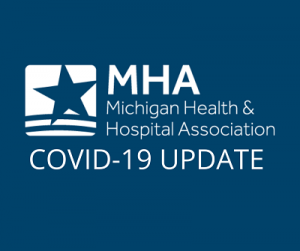Michigan’s hospitals are facing a funding crisis, putting communities and families across the state at risk of losing access to high-quality, timely healthcare. Health systems, business and university leaders are urging policymakers to address the crisis to avoid further reduction of available beds and access to care and healthcare services.
Michigan has lost a high of 1,700 staffed hospital beds since 2020 due to lack of staffing. This creates a cascade of problems, from longer wait times in the emergency department, reduced services, particularly in rural areas, and more difficulty transferring patients to the appropriate care setting. Respiratory illnesses are also surging, making problems worse.

“Recently, we have seen a surge in cases of respiratory syncytial virus (RSV), flu and COVID. This puts an additional pressure on emergency departments and our already-strained inpatient bed capacity across Michigan, impacting care statewide. Without funding to address staffing shortages, we run the risk of compromising our ability to provide the same level of exceptional care that we’re accustomed to across the state,” said T. Anthony Denton, senior vice president and chief operating officer, University of Michigan Health System and Michigan Health & Hospital Association board chair.
A 2021 Washington Post-Kaiser Family Foundation survey found that nearly 30% of healthcare workers are considering leaving their profession altogether. The U.S. Bureau of Labor Statistics projects the need for 1.1 million new registered nurses nationwide by 2030, the Association of American Medical Colleges estimates two out of every five active physicians nationwide will be 65 or older within the next 10 years, and the nation faces a projected shortage of more than 3.2 million lower-wage healthcare workers such as medical assistants, home health aides and nursing assistants, according to a Mercer report.
“The overall health and prosperity of Michigan is inextricably tied to the state’s investment in its healthcare and higher education enterprises,” said Daniel Hurley, CEO of the Michigan Association of State Universities. “Michigan’s public universities, together with our hospital and other healthcare partners, look forward to working with state leaders to ensure a future healthcare workforce that is capable of providing the highest levels of quality care for all Michiganders.”
The healthcare workforce shortage — combined with an aging population, a rise in chronic diseases and behavioral health conditions and advancements in medical care delivery — all contribute to an immediate need for resources that will allow hospitals to continue to provide the care residents need and deserve.
Despite staffing losses attributed to the COVID-19 pandemic, healthcare directly employed nearly 572,000 Michigan residents in 2020, continuing to make it the largest private-sector employer in the state. The 2022 Economic Impact of Healthcare in Michigan report found that direct healthcare workers in Michigan earned $44.2 billion in wages, salaries and benefits, with indirect, healthcare-supported workers earning about $28 billion wages, salaries and benefits.
“With healthcare being the largest private-sector employer, a healthy Michigan economy is directly linked to a properly funded healthcare system,” said Susan Smith, executive director, Economic Development Partnership of Hillsdale County. “Without access to healthcare services to support our communities, ranging from obstetrical units to trauma centers, we cannot remain economically competitive, attract or retain talent, or support placemaking for young families and care for everyone at all stages of life.”
Michigan officials have made recent short-term investments to address the hospital staffing crisis, but additional funding remains unappropriated that if used as intended, can improve hospital capacity and service lines. Michigan also needs a long-term funding solution to address stagnant reimbursement that has yet to respond to inflationary pressures to improve the retention of existing healthcare workers and recruit future workers to ensure that residents continue to have access to healthcare services.
Learn how you can help your local hospital or health system by visiting MiCareMatters.org.
Additional quotes:

“Hospitals have an immediate need for resources to continue to provide the services residents need and deserve – like ambulances available for lifesaving care,” said JJ Hodshire, president and chief executive officer, Hillsdale Hospital. “As a rural hospital, we excel at being innovative to make the best use of our resources, particularly staff. However, we can only stretch resources for so long. Everyone can agree that access to lifesaving emergency medical care is a basic need for Michiganders and residents should be able to receive specialized care no matter where they live.”
“My colleagues in pediatric units across the state have spent the past month responding to one of the worst respiratory illness surges I can remember as a physician and the biggest challenge to our ability to care for more children was our lack of available staff,” said Dr. Rudolph P. Valentini, chief medical officer, Children’s Hospital of Michigan and group chief medical offer at Detroit Medical Center. “We can’t afford to have another surge of sick, hospitalized children before something is done to improve the health of our hospitals and health systems.”

“Michigan residents deserve quality, accessible healthcare services and without hospital resources to adequately provide that care, Michigan hospitals have and will continue to face difficult decisions about what services they can offer,” said Brian Peters, chief executive officer, Michigan Health & Hospital Association.”

